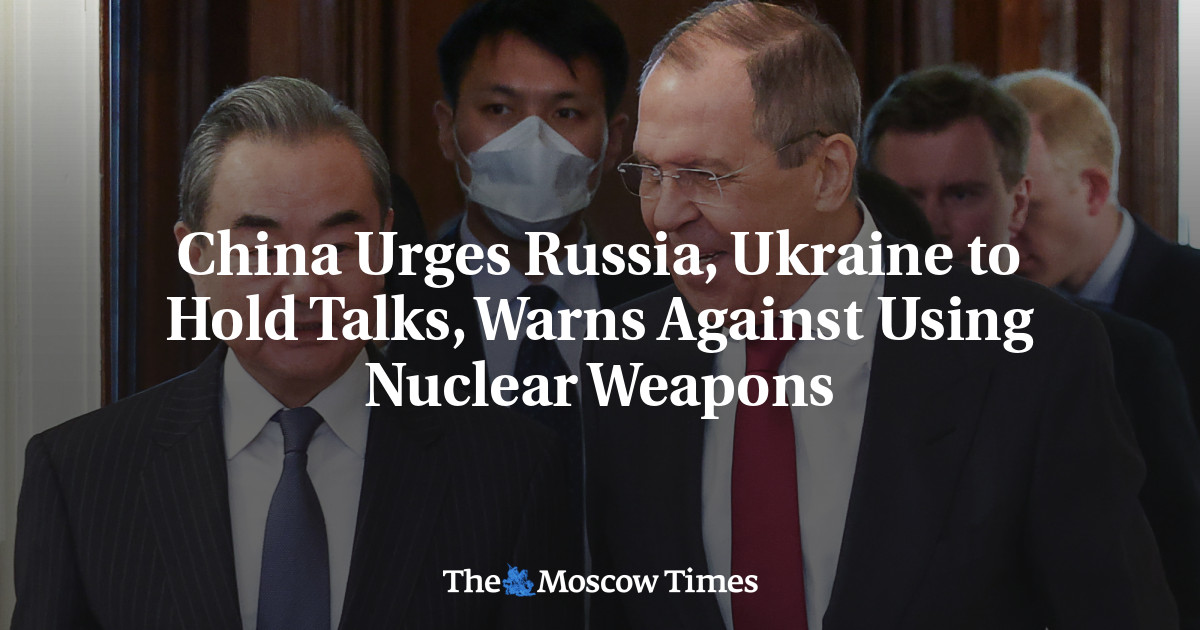
China called Friday for urgent peace talks as it released its plan to end the war in Ukraine, but Western powers quickly rebuffed the proposals while warning against Beijing’s closening ties to Moscow.
The 12-point paper calling for a “political settlement” of the crisis follows accusations from the West that China is considering arming Russia, a claim Beijing has dismissed as false.
Timed to coincide with the one-year anniversary of Russia’s invasion of Ukraine, the paper calls for all parties to “support Russia and Ukraine in working in the same direction and resuming direct dialogue as quickly as possible.”
It also makes clear its opposition to not only the use of nuclear weapons, but the threat of deploying them, after Russian President Vladimir Putin threatened to use Moscow’s atomic arsenal in the conflict.
The United States immediately slammed the paper, with President Joe Biden’s national security advisor saying the war “could end tomorrow if Russia stopped attacking Ukraine and withdrew its forces.”
“My first reaction to it is that it could stop at point one, which is to respect the sovereignty of all nations,” Jake Sullivan told CNN.
“Ukraine wasn’t attacking Russia. NATO wasn’t attacking Russia. The United States wasn’t attacking Russia,” he said.
“Russia has already lost this war.”
And at a press conference in Beijing, Ukrainian and EU diplomats urged China to do more to press Russia to end the conflict.
Zhanna Leshchynska, charge d’affaires at the Ukrainian embassy, called on Beijing to leverage its stated neutrality and “talk to both sides.”
“China should do everything in its power to stop the war and restore peace in Ukraine and urge Russia to withdraw its troops,” she said.
“We see the Chinese side mostly talk to Russia but not with Ukraine.”
Jorge Toledo, the EU ambassador to China, said Beijing has a “special responsibility” as a permanent member of the UN Security Council to uphold peace.
“Whether this is compatible with neutrality, I’m not sure, it depends on what neutrality means,” he said.
“China has to uphold and defend and promote these values that are being grossly violated by the aggressor in this war.”
Strategic allies
China has sought to position itself as a neutral party in the conflict while maintaining close ties with strategic ally Russia.
Top Chinese diplomat Wang Yi on Wednesday met with Putin and Russia’s Foreign Minister, Sergei Lavrov, in Moscow.
A readout of the meeting published by Chinese state news agency Xinhua quoted Wang as saying China was willing to “deepen political trust” and “strengthen strategic coordination” with Russia.
Following Wang’s visit, Moscow said Beijing had presented its views on approaches to a “political settlement” of the conflict.
Ukrainian President Volodymyr Zelensky said Thursday he had not seen any Chinese peace plan and wanted to meet with Beijing over the proposal before assessing it.
Friday’s document showed Beijing “clearly views the conflict in Ukraine as a product of what it says is Cold War mentality and an outdated European security architecture,” said Manoj Kewalramani, a China expert at the Takshashila Institution in Bengaluru, India.
“The concerns reflected in this document are around escalation and spillover effects,” he told AFP, adding that Beijing would likely prefer peace talks to focus on “a new European security architecture rather than the war itself.”
Since Russian tanks rolled over the border into Ukraine, China has offered Putin diplomatic and financial support, but refrained from overt military involvement or sending lethal arms.
Washington believes that might be about to change, voicing concerns that China could be planning to supply Russia with weapons to prop up its war effort. Beijing has denied the claims.
But one analyst suggested the Chinese policy paper could be laying the groundwork for further involvement by Beijing in the conflict.
“The absence of a proscription against arms transfers concerns me,” former U.S. Department of Defense official Drew Thompson wrote on Twitter.
“It is possible Beijing is getting ready to provide Russia with lethal support.”